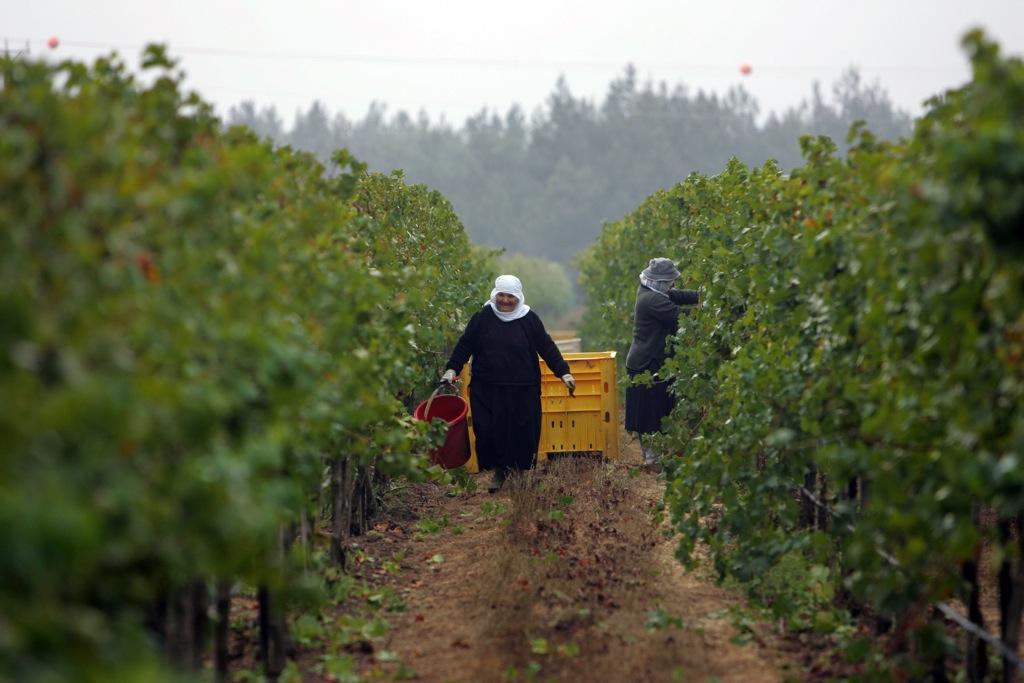Make wine, not war
Israeli Druze women harvest Viognier grapes for the Golan Heights winery at dawn in a vineyard in Moshav Odem.
KATZRIN, Golan Heights— It has been a scorcher of a summer even by Israeli standards, with temperatures settling near 116 degrees Fahrenheit for much of the last month.
But among the general hangdog reactions, Israeli vintners are quietly whispering joyfully about what might be a blow out year. An unusually long and cold winter followed by a summer with peaks of heat could be just what the winemaker ordered.
"The year shows a lot of promise," says Tal Pelter, owner and winemaker of Pelter Winery, a highly regarded boutique winery.
Nowhere is this more true than in the Golan Heights, a contentious 700 square mile area that normally stands out as the site of Israeli-Syrian skirmishes. But with an average elevation of 3,300 feet, volcanic, rocky earth, gentle hills and cool evening breezes, the Golan turns out to be better land for winemaking than for warmongering.
More from GlobalPost: In Israel, life under fire isn't always so bad
Ancient people may have known this. The Golan has been inhabited since the Lower Paleolithic era. In 1972, a visiting American professor of oenology sifted some of the dark, aerated soil and announced that it was auspicious for grape growing.
Eight local collective farms took his advice seriously. Grapevines were first planted on the Golan plateau in 1976, yielding wine in 1984, released by the then-revolutionary Golan Heights Winery.
Since then, wine has become a local way of life and over a dozen of the most highly regarded wineries in Israeli-held territory are located on the Golan Heights. No less a mandarin than Robert Parker, the owner of Wine Advocate, has given his imprimatur.
Israel captured the Golan Heights in 1967, during the Six-Day War. In 1981, to great international dismay, Israel annexed the plateau extending its law over the entire territory and offered the Druze residents Israeli citizenship. About 20 percent of them accepted.
In the mid-90s, when the Oslo peace process appeared to be a region-changing possibility, pro-peace Tel Avivians sipping excellent Golan Cabernets would wring their hands and reassure one another that no matter how far peace went, Shimon Peres, then the deputy prime minister and a great wine lover, would never relinquish the vineyards.
More from GlobalPost: Hamas goes soft
In late-night conversations, drinkers would seriously debate the possibility of a land-lease agreement in which a newly sovereign Syria would rent Israel the Golan vines. At the time, Golan Heights Winery Chief Winemaker Victor Schoenfeld was asked almost daily what he would do if the lands under his feet were returned to Syria.
The subject of a return to Syria seems farther than ever these days, though the Syrian battle lines are drawing ever closer. Wine tourists, eco-bikers and archeology fans now mingle with war tourists who are eager to spy on Syria's battles from a safe distance.
"We hear the fighting from our vineyards, but there is no discernable effects on the vines," said Yoav Levy, a wine fanatic who opened Bazelet HaGolan in 1998. He speaks with the dry expressiveness that characterizes his outlook and his wines.
The fruit is so plentiful this summer that he is constantly pruning. "We're just throwing fruit on the ground," he says, looking forward to an early harvest.
The experiment undertaken 35 years ago by local farmers that became the Golan Heights Winery is now a regional powerhouse producing more than six million bottles annually. It has racked up international awards for its buttery, oaky Chardonnays and its by-now renowned Cabernet Sauvignons. In a throwback to the style of old world winemaking, it is increasingly famed for a robust fleet of blends, like its newest hit, Rom, a wine made of Syrah, Cabernet and Merlot grapes.
More from GlobalPost: Bombing in the Israeli desert?
One of its spiritual progeny is Tal Pelter, a long and sinewy former combat officer as independent-minded as any of the Golan wine pioneers. He is among only a few Israeli producers of the noble Spanish varietal Tempranillo. And he is the only one to turn it out as a rosé.
"My vines are only 7-years old," he explains. "I can't make the kind of Tempranillo you get in Spain from 100 year old vines, with all the complexity and body. But I wanted to try the grape. So, rosé!"
He sees a "more balanced" year coming up. 2011 was too rainy, he said, and 2009 and 2010 were much too hot. "This winter was really great. And we're seeing very good ripening. A good season, and its been consistently cool at night."
Out among his vines, he hears the fighting across the border.
"Its an unpleasant feeling," he says. "I hope it will end soon, but I don't think so. I'm not optimistic, but I hope they find peace."
We want to hear your feedback so we can keep improving our website, theworld.org. Please fill out this quick survey and let us know your thoughts (your answers will be anonymous). Thanks for your time!
